More than 42,000 young people have already accessed mental health content and talked about it with Ariel, UNICEF BR’s chatbot
Highlights
- More than 42 thousand people impacted by the project
- Approximately 700 thousand messages exchanged
- Among the project’s features, the “Ask for Help” is the most used, showing the need for active listening for young people dealing with mental suffering
BUSINESS X-RAY
About UNICEF in Brazil
The United Nations Children’s Fund (UNICEF) was created by the United Nations Organization in 1946 to promote the rights and welfare of children and adolescents in 190 countries and territories. It has been present in Brazil since 1950.
Location
Brazil
Business Type
Non-Profit Entity
Number of employees
More than 200 people
How many people the business serves
UNICEF works to guarantee the rights of every child and adolescent, concentrating its efforts on the most vulnerable.
Contracted Solutions
- RapidPro
- Weni IA
- Human Service Module
The “Pode Falar” project is an online help channel on mental health and well-being aimed at adolescents and young people between 13 and 24 years old, coordinated by the United Nations Children’s Fund (UNICEF) in Brazil.
With Ariel, a character who interacts with adolescents and young people in the project’s chatbot, created in partnership with several civil society organizations and companies with expertise in the area, such as Weni, users can enjoy a welcoming listening service anonymously and free of charge, during the attendants’ shifts.
With dialogues via chat, adolescents and young people inform their demands and go through an automated triage of the bot, which interacts as in a conversation and presents the offers available in the “Pode Falar”, according to the complexity of the questions asked by those who seek the channel.
They can receive reliable content on mental health, produced in language and formats friendly to new generations, they can leave anonymous testimonials with tips on how they overcame difficult situations, sharing these experiences with their peers, and chat with a human agent prepared to perform the welcoming listening and emotional first aid.
The Challenge
Depression and other mental sufferings have been considered as the evil of the century. This disease affects about 300 million people worldwide, according to the World Health Organization (WHO), and causes several impacts on the daily activities of the affected population. Often associated with adults and adolescents, it also affects children.
Research conducted between 2020 and 2021 by the Institute of Psychiatry at USP, called Youth in the Pandemic, investigated the mental health of children and adolescents, from 5 to 17 years old, at the worst moment of the coronavirus pandemic.
The data collected throughout Brazil through an online questionnaire identified symptoms of anxiety or depression in 27% of the 7 thousand people interviewed. In other words, social isolation increased the cases of depression.
Meanwhile, in 2020, UNICEF Brazil conducted a survey, through the U-Report, with more than 4,000 adolescents from all over Brazil, to learn more about mental health in the pandemic and psychological care.
It was found that 72% of the respondents felt the need to ask for help regarding their physical and mental well-being during quarantine, and 41% did not turn to anyone.
The alarming relationship between isolation and the increase in cases of mental suffering motivated UNICEF to think of ways to contribute to the well-being of this population in times of pandemic. Thus, You Can Talk was born.
The Solution: “Pode Falar” in practice
The project began in August 2020 and was finally launched on February 9, 2021, Safer Internet Day. “Pode Falar” debuted with a homepage, as well as an administrative panel to manage the site.
As mentioned above, the goal of the bot is to help teenagers and young people with content about dealing with mental distress. By means of chat, the bot is programmed to answer questions automatically on varied topics that are divided into three sessions:
- I want to take care of myself: where users find materials with guidance for self-care;
- I want to be inspired: where they leave testimonials about how they overcame difficult situations; and
- I want to talk: where they are directed to human service via chat, offered by people trained to work with adolescents and young people in a multidisciplinary model.
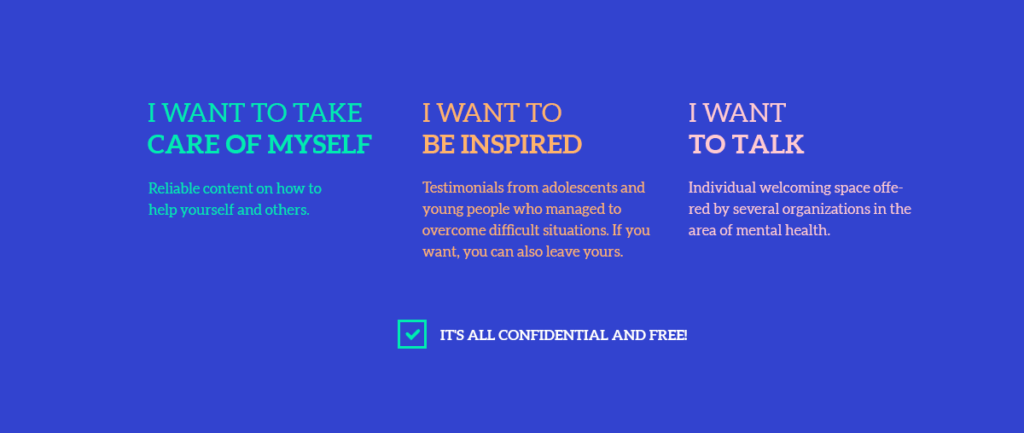
Contact with Ariel can be made through various channels, all of which are designed to facilitate access for those in need. These are the channels:
- Site: https://www.podefalar.org.br/
- WhatsApp: no +55 61 9660-8843, e
- Instagram: by direct @canal.podefalar, since September 2022.
Initially, Ariel received intelligence to attend and deal with contents focused on the perception about the pandemic, but today, it is possible to find a plurality of subjects that arouse young people’s interest. For example:
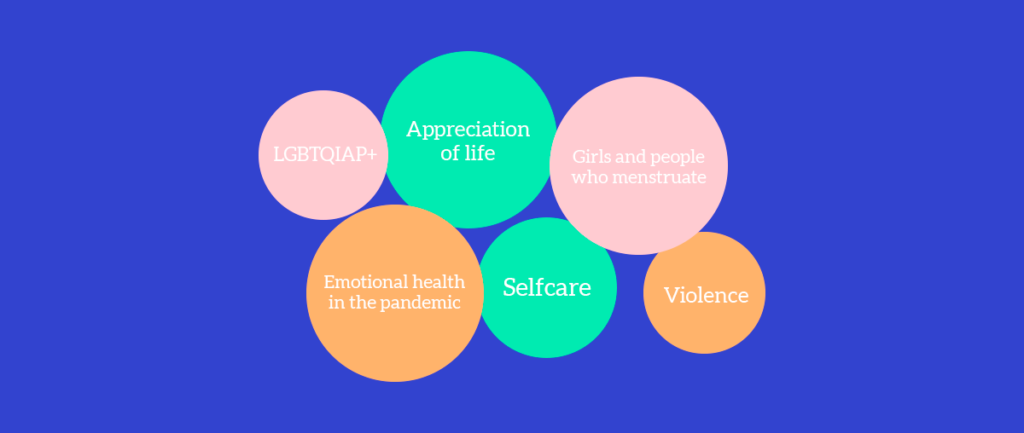
Through registered questions, it is possible to get demographic information (age, state, gender, race, if the person is disabled) of the person who contacted. This data is relevant to understand the reality in which the person is inserted.
Soon after, a question about the person’s emotional state is asked to see if the bot continues to offer the existing materials or, in cases of identified mental suffering, the person is already directed to human care.
The internet and technology play a fundamental role in the lives of girls and boys, and so “Pode Falar” uses this to create a welcoming, non-judgmental, and anonymous listening space for this public in moments of crisis. In it, you can also access support materials, information, and service.
Gabriela Mora, of UNICEF in Brazil.
Communication between Ariel and the youth
When the project was conceived, one of the goals was for Ariel to have easy and fast communication with the teenagers who contacted her. So, the whole chat script was designed to facilitate the dialogue.
So, when a young person talks to Ariel, they encounter the following messages:
1- The chatbot introduces itself, shows the privacy statement, and asks if the user accepts
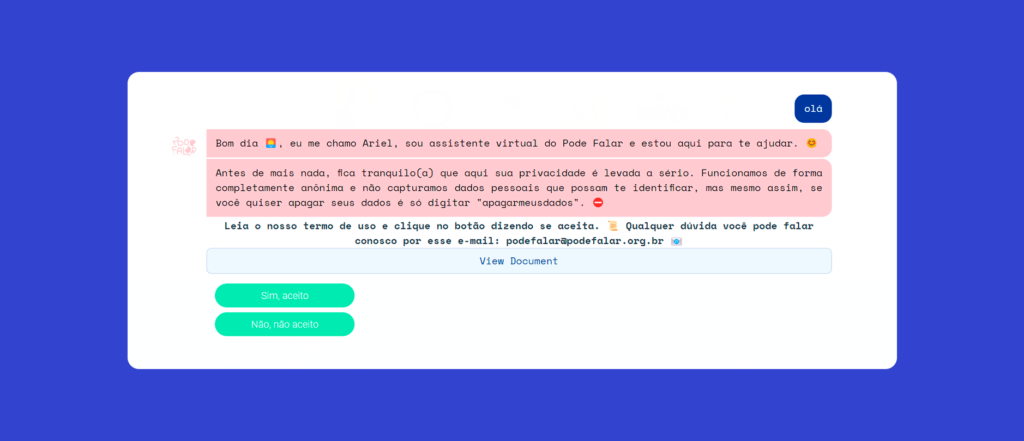
2- The user’s age, gender, race, possible disabilities and region are collected
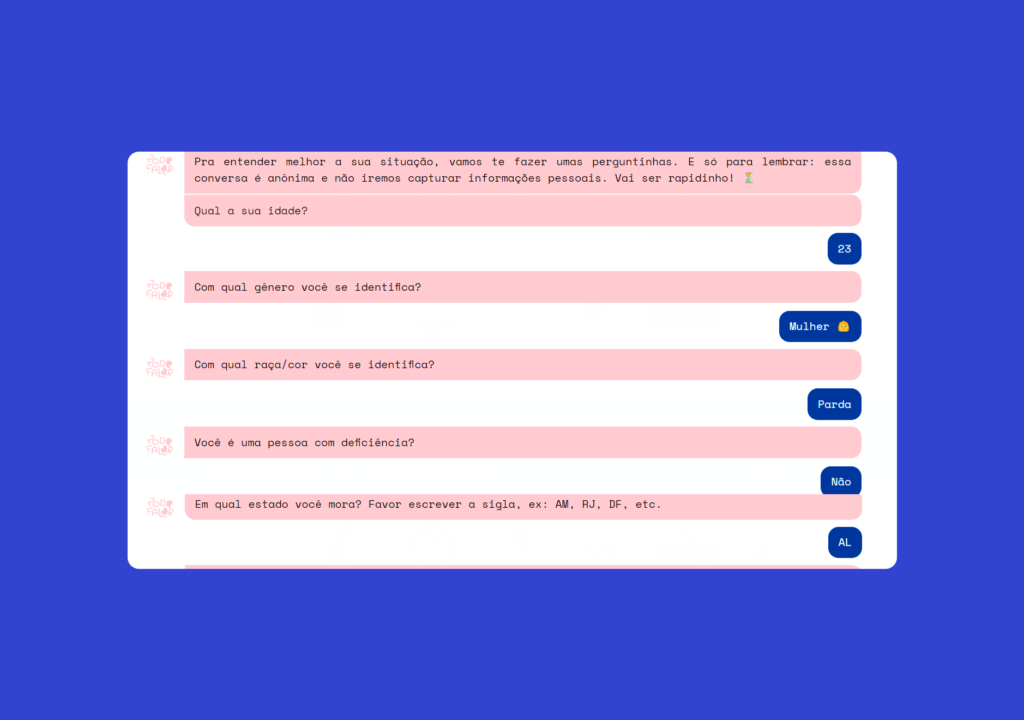
3- The young person is asked how they are feeling
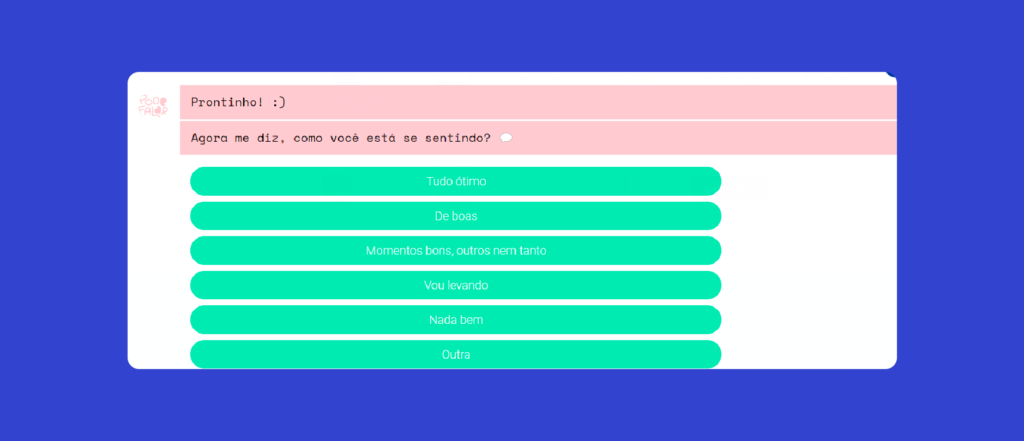
4- Depending on the response, it can be sent to the Centro de Valorização da Vida (CVV), the Life Valuation Center, or the flow proceeds normally to the main menu with the following options:
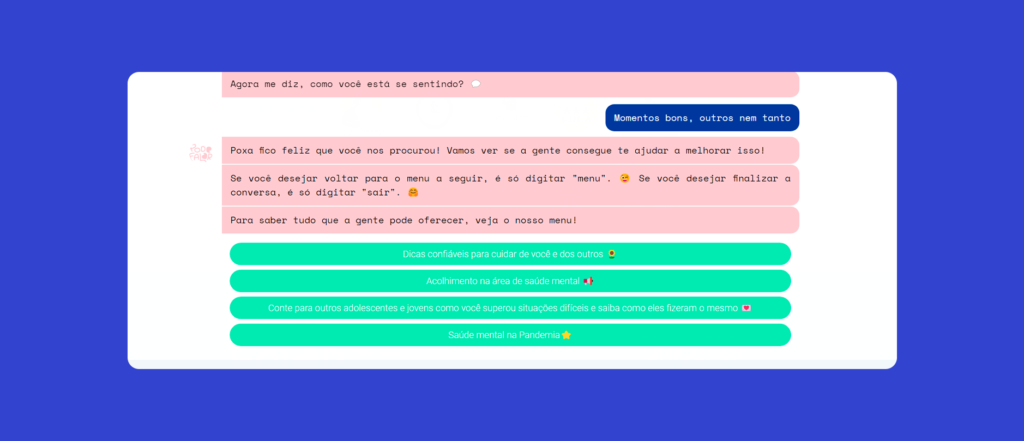
5- When clicking on reliable tips for caring for yourself and others, he is presented with the following topics:
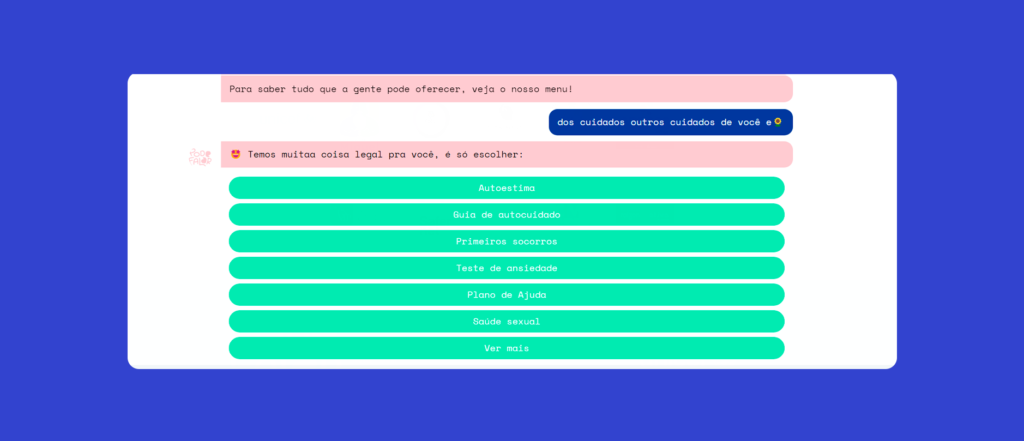
6- After any menu completion point, the user enters a completion/suggestions flow.
In the more specific cases, where there is a need to talk or vent, the service user can find a trained attendant to listen to him or her, during office hours, published on the site and on the bot. This service, offered by specialized professionals, works most days during business hours.
The project relies on the help of external partners with expertise in mental health and in welcoming listening and socio-emotional health of adolescents and young people. They are:
- Núcleo do Cuidado Humano (Human Care Hub) from UFRPE (Universidade Federal Rural de Pernambuco)
- Associação pela Saúde Emocional de Crianças (Association for Children’s Emotional Health)
- Abraço Jovem – Balneário Camboriú
- Cedeca – Rondônia
- Vita Alere Institute
- Centro de Valorização da Vida (Life Valuation Center)
- Syntese
- Conselho Nacional do Ministério Público (National Council of Public Prosecutors)
- Programa Vidas Preservadas (Preserved Lives Program), created by MPCE (Public Prosecution Service of the State of Ceará).
To give visibility to the project, a series of communication actions were carried out, including with influencers and ambassadors of UNICEF Brazil.
The materials encourage the exchange of experiences and remind people that everyone needs to take care of their minds the same way they take care of their bodies, breaking the taboo of not talking about mental health.
The work, which began during the pandemic period, in response to a desire of adolescents, continues to grow and take root in the territories, expanding the number of on-duty teams and the connections with local care networks, through the entry of new partners such as Higher Education Institutions from all over the country and the FIOCRUZ/MS.
With the return to face-to-face life in 2022, the project has noticed a change in the profile of the cases attended to, with less anxiety caused by social distancing and more situations of social vulnerability with a negative impact on the mental health of this public.
How Weni worked with UNICEF in Brazil
Using technology to bring social impact is part of Weni’s vision. Proof of this are the various projects we have with UNICEF. This long-standing relationship, which began back in 2013, intensified with our contribution to the development of the U-Report.
This UNICEF resource is responsible for encouraging the participation of young people as agents of change in issues relevant to society. Through it, kids can get involved in polls and chats, access news and stories posted by young people around the world, and denounce problems in their neighborhoods.
U-Report is the basis of the “Pode Falar” project, and Weni, which specializes in the development of chatbots, powers the communication of projects with intelligent technologies hosted on the tool
Weni’s contribution to the evolution of the U-Report tool and the work done via U-Report in Mexico inspired “Pode Falar” itself, so one can say that Weni was active in the project since the first prototype.
Thus, the Weni solutions that integrate the project, are:
RapidPro
Online platform that allows you to create chatbot conversation flows in just a few clicks. It has integration with UNICEF’s chosen channels and treats users equally, regardless of where they speak. Weni is the RapidPro host for the project.
Weni AI
Applied in the chatbot to understand the sentiment in the answers sent by young people with Binary Answers, which captures whether the user is affirming, denying or doubting some sentence in 4 intentions: affirmative, negative, doubt and bias (treatment of false positive errors).
In addition to the Binary Answers system, Sentiment Analysis is also used, which has two intentions: Good – related to positive feelings and Bad – related to negative feelings.
Human Service Module
Module where you can register users and ensure that they receive specific requests, by assignment and automatic transitions. It is with this feature that the trained teams are triggered to welcome the young people.
It is also worth noting Weni’s contribution to ensure that communication between teens and young people with the chatbot remains anonymous. A configuration to replace the user’s name with a code was adopted, reinforcing the idea of not capturing personal data that identifies the person during the conversation.
Weni’s expertise with U-Report is what led us to go with them on “Pode Falar”. The constant dialog with our service team, project management and support helped us in the operationalization of Ariel.
Gabriela Mora, of UNICEF in Brazil.
Results
When we look at the project’s data, we see the need for social impact initiatives like these. In just the first week of the bot’s launch, 3.723 people had already contacted Ariel.
In just over a year, “Pode Falar” adds up the following numbers:
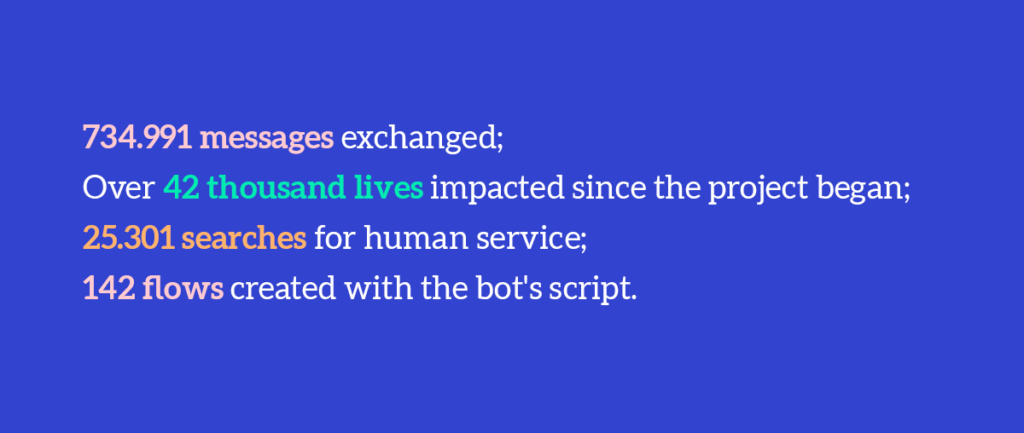
On the project’s official website, it is possible to find testimonials from young people who came into contact with Ariel and were positively affected. Reading them, we can confirm the need for spaces destined for debate about mental health, such as the “Pode Falar”.
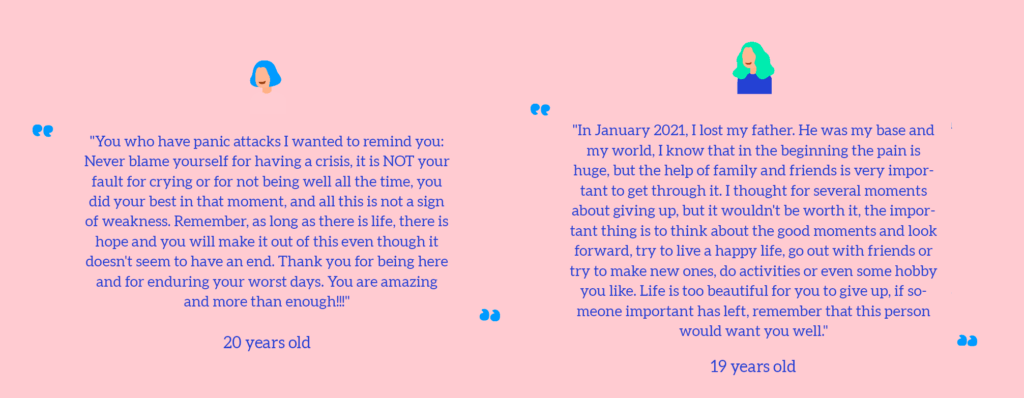
Next steps in the project
The goal is to expand the territorial coverage of “Pode Falar”, with the expansion of partners to all states of the country, also thinking about integrating the channel in the local networks of attention and care in mental health.
This process is taking place with the adhesion of a partner Higher Education Institution (HEI) in each state of the country for the formation of new teams of agents.
This institutions who will undergo training offered by the Núcleo do Cuidado Humano da Universidade Federal Rural de Pernambuco (UFRPE), and the creation or strengthening of multidisciplinary research centers in adolescent and youth mental health, as well as the evaluation and monitoring of public policies on the subject.
We are already working on expanding our service capacity, with the incorporation of new teams and partners, especially Higher Education Institutions, coordinated by UFRPE and the communities of practice coordinated by FIOCRUZ/MS. In this phase, besides expanding, we have started a process of rooting “Pode Falar” in the mental health care networks in the territories, starting from our anchor partners (universities) and from a community of practice work with FIOCRUZ in Goiás, Maranhão, and Pará.
Gabriela Mora, of UNICEF in Brazil.
Social Impact
Social impact initiatives can have greater reach through technological solutions. Several projects understand the need to expand communication by exploring tools like Weni’s chatbots.
We take pride in using technology to impact lives and seek to be increasingly effective in using our expertise to solve social problems, promote inclusion, and as in the case of the “Pode Falar” project, connect those who need to talk to those who are able to listen.
So, if you are part of a third sector institution and are interested in our solutions, please contact us!

